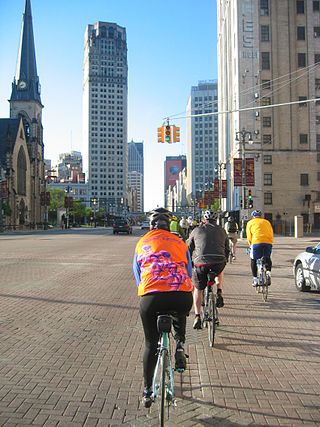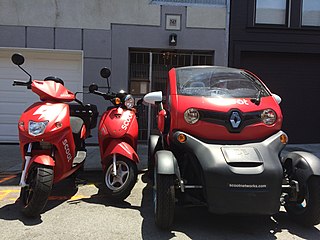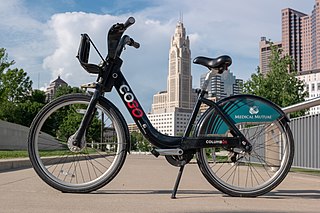
A kick scooter is a human-powered street vehicle with a handlebar, deck, and wheels propelled by a rider pushing off the ground with their leg. Today the most common scooters are made of aluminum, titanium, and steel. Some kick scooters made for younger children have 3 to 4 wheels and are made of plastic and do not fold. High-performance kickbikes are also made. A company that had once made the Razor Scooters revitalized the design in the mid-nineties and early two-thousands. Three-wheel models where the frame forks into two decks are known as Y scooters or trikkes.
Many countries have enacted electric vehicle laws to regulate the use of electric bicycles, also termed e-bikes. Some jurisdictions have regulations governing safety requirements and standards of manufacture. The members of the European Union and other regions have wider-ranging legislation covering use and safety.

Valley Regional Transit is a public agency which is the main provider of mass transit service in metropolitan Boise, Idaho. It operates 19 fixed-route services, mostly in Ada County, as well as two on-demand services in Canyon County and the city of Eagle.

Detroit is a popular city for cycling. It is flat with an extensive road network with a number of recreational and competitive opportunities and is, according to cycling advocate David Byrne, one of the top eight biking cities in the world. The city has invested in greenways and bike lanes and other bicycle-friendly infrastructure. Bike rental is available from the riverfront and tours of the city's architecture can be booked.

Capital Bikeshare is a bicycle-sharing system, which serves Washington, D.C., and certain counties of the larger metropolitan area. As of January 2023, it had 700+ stations and more than 5,400 bicycles. The member jurisdictions own most of the equipment and have sourced operations to contractor Motivate International. Opened in September 2010, the system was the largest bike sharing service in the United States until New York City's Citi Bike began operations in May 2013.
Citi Bike is a privately owned public bicycle sharing system serving the New York City boroughs of the Bronx, Brooklyn, Manhattan, and Queens, as well as Jersey City and Hoboken, New Jersey. Named after lead sponsor Citigroup, it was operated by Motivate, with former Metropolitan Transportation Authority CEO Jay Walder as chief executive until September 30, 2018, when the company was acquired by Lyft. The system's bikes and stations use technology from Lyft.

Divvy is the bicycle sharing system in the Chicago metropolitan area, currently serving the cities of Chicago and Evanston. The system is owned by the Chicago Department of Transportation and has been operated by Lyft since 2019. As of Sept 2021, Divvy operated 16,500 bicycles and over 800 stations, covering 190 square miles.

Bay Wheels is a regional public bicycle sharing system in California's San Francisco Bay Area. It is operated by Motivate in a partnership with the Metropolitan Transportation Commission and the Bay Area Air Quality Management District. Bay Wheels is the first regional and large-scale bicycle sharing system deployed in California and on the West Coast of the United States. It was established as Bay Area Bike Share in August 2013. As of January 2018, the Bay Wheels system had over 2,600 bicycles in 262 stations across San Francisco, East Bay and San Jose.

Bike Share Toronto is a bicycle-sharing system in Toronto, Ontario, operated by the Toronto Parking Authority (TPA). The system consists of over 9,000 bicycles and over 700 stations, and covers over 200 square kilometres in 21 of the 25 wards of the city, with plans to expand to the entire city by 2025.

PBSC Urban Solutions, formerly the Public Bike System Company, is an international bicycle-sharing system equipment vendor with their headquarters based in Longueuil, Quebec. The company develops bicycle-sharing systems, equipment, parts, and software, and sells its products to cities in Canada, the United States, the United Kingdom, Spain, Brazil and more. The company has sold about 100,000 bikes and 9,000 stations to 45 cities.

Healthy Ride is a public bicycle sharing system that serves parts of Pittsburgh. Operations started on May 31, 2015, with 50 stations and 500 bikes. The system is owned and operated by Pittsburgh Bike Share, a Pittsburgh-based 501c3, with bikes provided by Nextbike.

Mobi is the trade name of Vancouver Bike Share, Inc. a bicycle-sharing system in Vancouver, British Columbia, Canada. The system is administered by the city and is owned and operated by CycleHop. The system launched on July 20, 2016, with a limited number of stations and bicycles for founding members.

Baltimore Bike Share was a bicycle sharing system that served the city of Baltimore, Maryland. The system had more than 50 stations, all owned by the Baltimore City government, and operated in a public–private partnership with Bewegen Technologies and Corps Logistics. Launched in 2016, Baltimore Bike Share had the largest electrical-assisted cycling (Pedelec) fleet in North America.

Mahindra GenZe, doing business as GenZe and also known as GenZe by Mahindra, was a brand of electric bicycles and scooters. It was a subsidiary of the Mahindra Group of India.

Scoot Networks, also known as just Scoot or Scoot Rides, is an American company which provides public electric scooter and electric bicycle sharing systems. The company is based in San Francisco, California.

CycleHop LLC is a bicycle sharing platform and mobility company that operates bike share systems in fifteen cities in North America, including Vancouver Bike Share in British Columbia.

Micromobility refers to a range of small, lightweight vehicles, driven by users personally. Micromobility devices include bicycles, e-bikes, electric scooters, electric skateboards, shared bicycle fleets, and electric pedal assisted (pedelec) bicycles.

CoGo Bike Share is a public bicycle sharing system serving Columbus, Ohio and its suburbs. The service is operated by the bikeshare company Motivate It was created in July 2013 with 300 bikes and 30 docking stations, since expanded to about 600 bikes and 80 stations. The service is operated in conjunction with the City of Columbus, which owns all equipment.

MYBYK is a station-based bicycle-sharing and renting service in India.



















